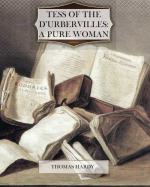|
This section contains 2,284 words (approx. 6 pages at 400 words per page) |

|
One of the" Angry Young Men" writers of the 1950s whose writings expressed bitterness and disillusionment with society, English novelist and critic Hinde examines the ways that Tess's fate mirrors the destruction of the agricultural class in England at the end of the nineteenth century.
The plot of Tess of the D'Urbervilles turns on a succession of accidents and coincidences. Again and again Tess's tragic fate depends on some disastrous mischance. One or two of these may seem possibleafter all is full of mischancebut heaped on top of each other they produce a final effect of gross improbability. Does this matter? Are we to see them as blemishes on an otherwise fine novel; or are they such a pervasive part of it that they must either condemn it or form part of its success?
At its face value the novel suggests not only that...
|
This section contains 2,284 words (approx. 6 pages at 400 words per page) |

|




